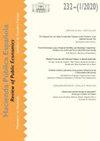The Political Economy of Taxation in Europe
IF 0.7
4区 经济学
Q3 ECONOMICS
Hacienda Publica Espanola-Review of Public Economics
Pub Date : 2017-03-01
DOI:10.7866/HPE-RPE.17.1.5
引用次数: 8
Abstract
Political variables play a crucial role in shaping tax systems and tax reforms in Europe. This paper presents new evidence on the relationship between political factors and tax design in European countries. For the period 1995-2012, we find that, when the country’s ruling coalition is left-wing, income taxes become more relevant. Moreover, when the largest government party is more powerful, the share of property taxes over GDP increases, while the number of seats held by the second government party is positively associated with the level of consumption taxes over GDP. We also find that a more powerful government is associated with a lower top tax rate of the personal income tax (PIT). Building upon this evidence, we review the main arguments developed by the empirical political economy literature on taxation and discuss the role of political factors in fundamental issues of taxation: redistribution and progressivity; tax design and its impact on growth; tax complexity; tax administration; tax competition; and the need for tax reforms.欧洲税收的政治经济学
政治变量在塑造欧洲税收制度和税收改革方面发挥着至关重要的作用。本文为欧洲国家的政治因素与税收设计之间的关系提供了新的证据。在1995-2012年期间,我们发现,当该国的执政联盟是左翼时,所得税变得更加重要。此外,当最大的政府党更强大时,财产税在GDP中的份额会增加,而第二政府党的席位数量与消费税在GDP上的水平呈正相关。我们还发现,一个更强大的政府与较低的个人所得税最高税率有关。基于这一证据,我们回顾了实证政治经济学文献中关于税收的主要论点,并讨论了政治因素在税收基本问题中的作用:再分配和累进性;税收设计及其对增长的影响;税收复杂性;税收管理;税收竞争;以及税收改革的必要性。
本文章由计算机程序翻译,如有差异,请以英文原文为准。
求助全文
约1分钟内获得全文
求助全文
来源期刊

Hacienda Publica Espanola-Review of Public Economics
Economics, Econometrics and Finance-Finance
CiteScore
0.90
自引率
14.30%
发文量
14
期刊介绍:
Hacienda Pública Española/Review of Public Economics welcomes submissions on all areas of public economics. We seek to publish original and innovative research, applied and theoretical, related to the economic analysis of Government intervention. For example, but not exclusively: Taxation, Redistribution, Health, Education, Pensions, Governance, Fiscal Policy and Fiscal Federalism.
In addition to regular submissions, the journal welcomes submissions of:
-Survey Reviews, containing surveys of the literature regarding issues of interest in the Public Economics field;
-Policy oriented reviews, showing the current contributions of Public Economics in relation to relevant contemporary issues affecting public decision-makers in the real world (Policy Watch);
-Comments of previously published articles. Contributions to this section should be limited to a maximum of 2 000 words (12 pages). If deemed adequate, the authors of the commented article will be given the opportunity to react in a Reply. Both Comment and Reply will be published together.
Articles for the Survey Reviews and Policy Watch section are subject to the same double blind reviwing procedure. The adequacy of Comments submitted for publication will be evaluated by the Executive Editors.
 求助内容:
求助内容: 应助结果提醒方式:
应助结果提醒方式:


